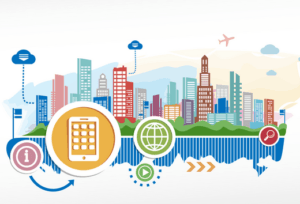Engineer advocates building smart cities in Ghana
 With the future expected to adopt the Smart Cities concept, Mrs Carlien Bou-Chedid, a Structural/Earthquake Engineering Consultant and the President Elect, Federation of African Engineering Organisation, has advocated the building of such cities in the country.
With the future expected to adopt the Smart Cities concept, Mrs Carlien Bou-Chedid, a Structural/Earthquake Engineering Consultant and the President Elect, Federation of African Engineering Organisation, has advocated the building of such cities in the country.
A smart city is an urban area that uses different types of electronic internet of things sensors to collect data and then use these data to manage assets and resources efficiently.
This include data collected from citizens, devices and assets that is processed and analysed to monitor and manage traffic and transportation systems, power plants, water supply network, waste management, crime detection, information systems, schools, libraries, hospitals and other community services,
“The future is in smart cities, the internet of things, big data. In smart cities, data will be collected from citizens, devices, and assets using sensors. Data is already now a most valuable resource that can be used to achieve several ends,” Mrs Bou-Chedid stated.
She said this in Accra at the launch of the maiden National Development Forum organised by the National Development Planning Commission (NDPC), on the theme “Ghana@100: An Agenda Towards a Solidly Developed Nation”.
The National Development Forum will be a series of a monthly forum to engage the public on development policy and promote ownership and accountability for the implementation of national priorities.
It will focus on topical national issues about the economy; social development; spatial planning; infrastructure development; environment; and governance.
Mrs Bou-Chedid noted that big data, which refers to the use of advanced data analytical methods to extract value from data, could be used to spot business trends, prevent diseases, combat crime ensure value for money in procurement.
She said these developments were already in existence, adding that, business models would change.
“Some jobs will no longer exist in a few years’ time. Critical thinking will not be a buzz word. It will be necessary for our very survival.”
Mrs Bou-Chedid said Ghana at hundred would be a developed country, at least when measured by today’s standards.
“By this I mean that when it is compared to other countries of today, Ghana will be advanced in terms of its infrastructure, industrialisation, income per capita and standards of living,” she said.
“We must however remember that the things that are considered advanced today may be obsolete tomorrow.”
She pointed out that development was generally measured against the development of other countries and in this and current fast-changing world, this means that the goal posts were constantly shifting.
She said Ghana’s level of development at 100 years would be dependent on the actions Ghanaians take today.
“We will have to decide from now, how we want to position ourselves in the world of the future so that we can together take appropriate steps to achieve our goal,” Mrs Bou-Chedid said.
“There is no doubt that our development and the choices we make will be shaped, especially by developments in science and technology, and the consciousness that new knowledge brings.”
She noted that whilst the countries of the past were able to industrialise without worrying too much about the effects it had on the environment, Ghanaians would have to look for ways that were friendlier to the environment.
She, however, said things quickly change in the world but there were certain things that were likely to remain the same at least for a much longer time.
“We will still need food and water, energy, means of communication, means of transportation, shelter and sanitation and I believe these are good starting points for a discussion,” she said.
Mrs Bou-Chedid said to improve the quality of life for the citizenry there was the need to provide these things.
She said there was no doubt that reaching the national goal would require collective effort.
“….The goal posts are constantly shifting and we need to put in our best efforts if we are to catch up with the developed countries of today.”
“We need to be smart enough to spot the opportunities presented by new technologies and use these technologies to reach our goals.”
Source: GNA
